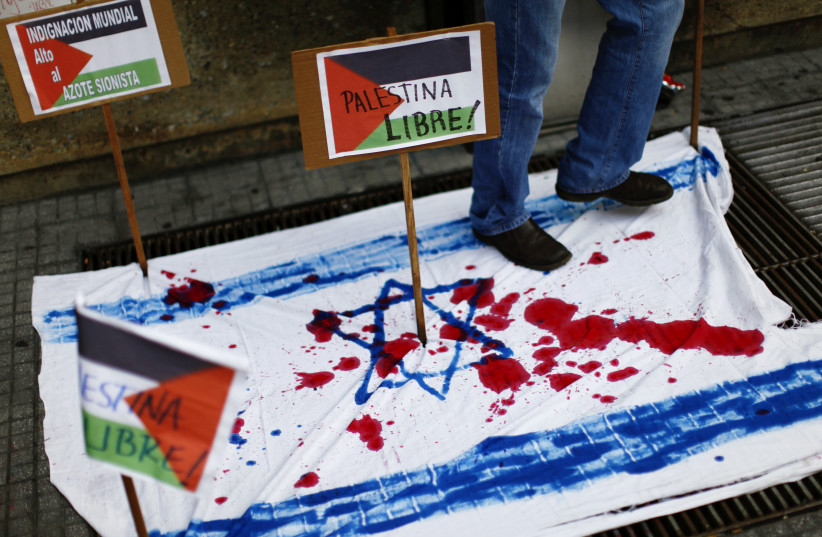In the aftermath of Hamas’ barbaric terrorist attacks against Israel on October 7 and Israel’s subsequent invasion of Gaza, attacks against Jews have skyrocketed across the Western world. Antisemitic incidents have surged by 361% in the United States, 132% in Canada, and are at record highs in the United Kingdom and near-record highs in the European Union. From violent threats and physical intimidation on public transit to widespread vandalism of Jewish-owned business, Jews are no longer safe in spaces or even countries where they were previously welcomed.
The media’s fixation on antisemitism in the West makes sense given that the Jewish Diaspora is concentrated in Western Europe and Anglo-America. But Jews do not only live in “rich” countries, and since the Hamas attacks on Israel, the media has failed to expose the day-to-day dangers faced by Jews living in less prominent regions such as Latin America.
For a Jew living in Argentina, Chile, or Mexico, a story condemning an antisemitic attack in Vancouver will only do so much. Stamping out antisemitism across the globe means stamping out antisemitism across the globe, and Latin America should be included in those efforts.
Latin America has long nurtured an antisemitic underbelly that has drawn scant international media attention, even after the October 7 attacks. Latin America is home to approximately 500,000 Jews, including nearly 200,000 in Argentina alone. In Brazil, antisemitic attacks have risen by nearly 1,000% since October 7.
In Peru, right-wing extremists targeted a prominent Peruvian Jewish journalist by screaming antisemitic chants outside his home, including showing posters of rats holding bags of money.
In Nicaragua, Jewish cemeteries have been vandalized and desecrated. Vicente Fox, Mexico’s former president, accused presidential candidate Claudia Sheinbaum – who has Jewish parents – of being “a Jew and foreigner at the same time.”
Argentina’s new president, Javier Milei, who claims to be an ally of Jewish people and Israel, appointed Rodolfo Barra to be the country’s lead prosecutor. Barra belonged to a right-wing group responsible for hundreds of antisemitic attacks, including attacks against synagogues, a violent riot in a Jewish neighborhood, and the murder of a Jewish lawyer. He will now be responsible for prosecuting antisemitism in Argentina.
Political leaders in nearly every Latin American country espouse popular tales about Jewish control of the media, politics, and the economy. Supporters of these antisemitic leaders include José Antonio Kast, the son of a Nazi SS lieutenant and frontrunner for the next Chilean presidential election, and Daniel Jadue, the mayor of Recoleta linked to the Palestinian Liberation Organization (PLO). A number of politicians and associations linked to former Brazilian president Jair Bolsonaro have also promoted antisemitic conspiracies and espoused neo-Nazi imagery.
In the past, such antisemitism has moved from words to murder.
In 1992, Hezbollah and Palestinian Islamic Jihad (PIJ) bombed the Israeli embassy in Buenos Aires, and later the AMIA (Asociación Mutual Israelita Argentina) Jewish community center in 1994, killing 114 people.
In 2009, armed vandals attacked the oldest synagogue in Venezuela as a protest against Israel – and rather than help its Jewish citizens, the Chávez government was quick to issue support to the terrorists.
Iranian involvement in Latin America
IRAN FUNDS operations against Jews and Israel and in the last five years has signed multiple security deals with Latin American governments. The regime also supports terrorist organizations, including Hezbollah, in conducting attacks against Israel and Jews in Latin America. Israel’s diplomats and intelligence operatives in the region are subject to frequent attacks, some deadly.
Governments are not helping. Shortly after Israel began its defense, Colombia, Honduras, Mexico, and Chile recalled their ambassadors from the region. Bolivia cut off diplomatic relations with Israel, accusing the nation of crimes against humanity.
Colombian President Gustavo Petro compared Israel to the Nazis, saying that they treated Gaza like the Warsaw Ghetto. Lula, Brazil’s President, also compared Israeli policy regarding Palestine as a “new Holocaust,” saying Israelis are the new Nazis. Manuel Zelaya, former president of Honduras, claimed anyone who supports Israel is not human.
Nicolás Maduro, the dictator of Venezuela, frequently goes on dehumanizing tirades against Jews and Zionists on national television.
Despite its problems, Argentina offers a path forward.
Back in 2019, the country’s Jewish community lobbied its leaders to create a task force to honor the victims of the AMIA attack and another to combat antisemitism. In addition, after the October 7 attacks, Argentina’s Jews created coalitions with other religious leaders within the country to denounce antisemitism and call for greater interfaith dialogue.
Western media should support these efforts to combat antisemitism in the region. A Jew in Chile or Mexico is not responsible for whatever “sins” Israel “commits or does not commit” in Gaza, and Jewish communities deserve to be treated with respect and dignity.
Antisemitism in Latin America will not go away overnight, but in order to fight it, one has to recognize it.
The West and Latin America alike have failed in that department.
Joseph Bouchard is a freelance journalist and analyst covering geopolitics in the Americas, with reporting experience in Bolivia, Colombia, and Brazil. His articles have appeared in The Diplomat, Mongabay, Le Devoir, La Razón, Responsible Statecraft, and Brazilian Report. He is a contributor with Young Voices, a nonprofit organization dedicated to supporting young journalists and columnists promoting heterodox thinking.
Garion Frankel is a Ph.D student in PK-12 educational leadership at Texas A&M University. He is a State Beat fellow for Young Voices, and his work has appeared in various outlets including USA Today, Newsweek, and the Dallas Morning News.

